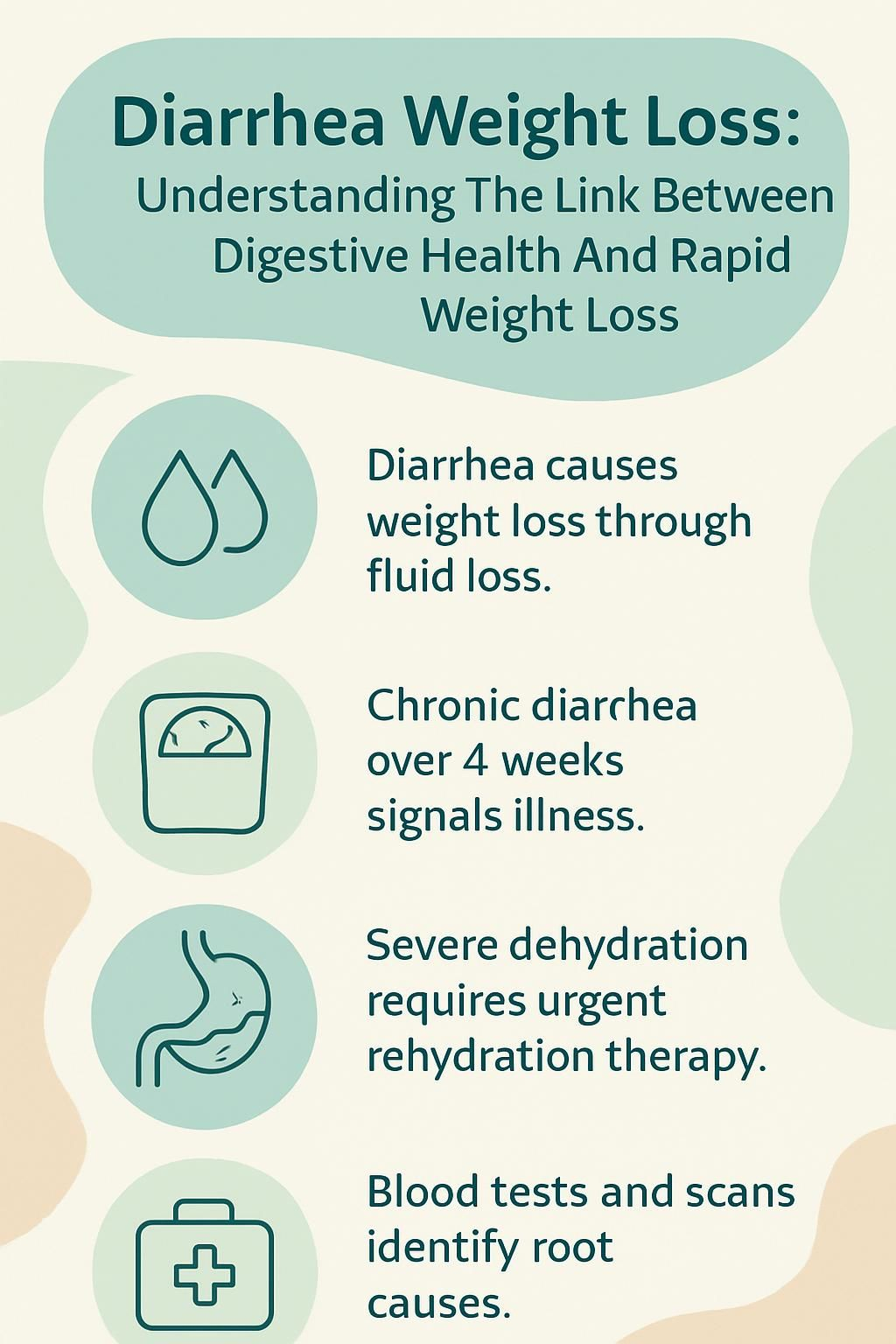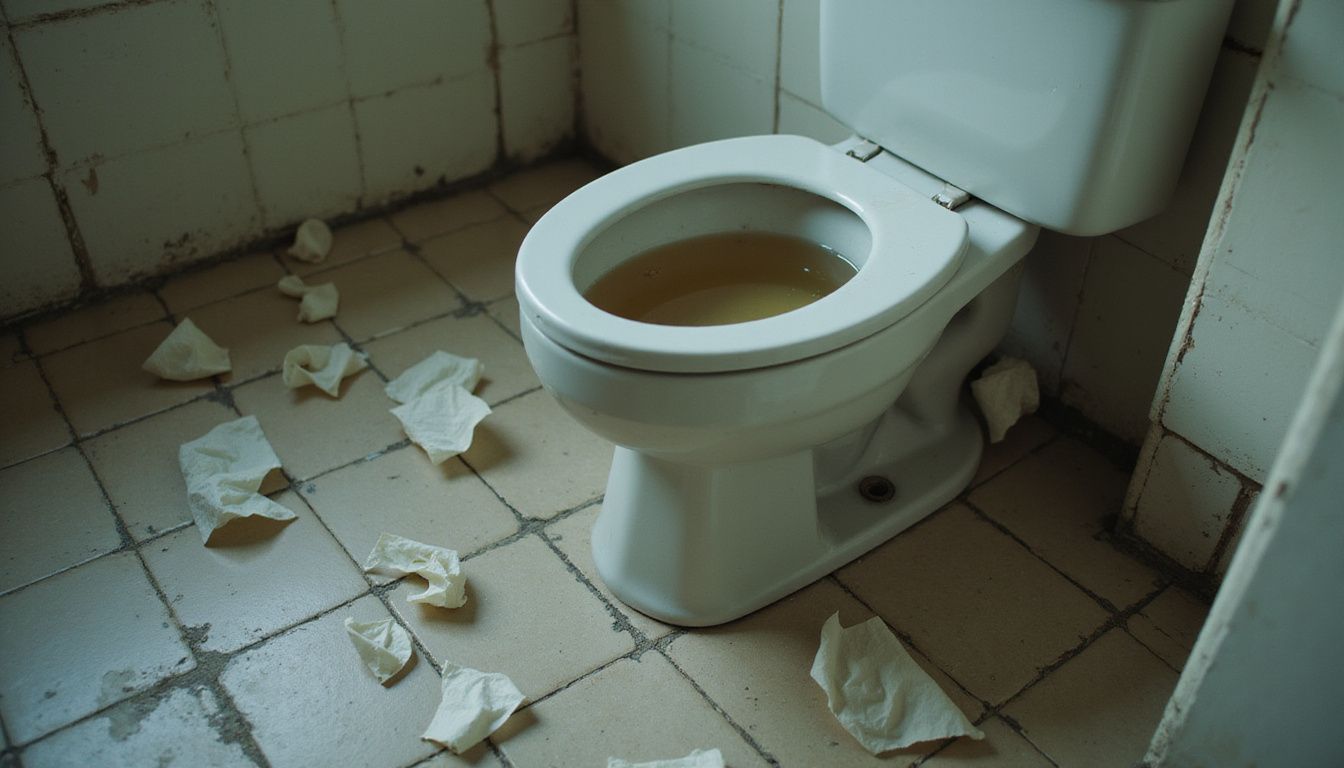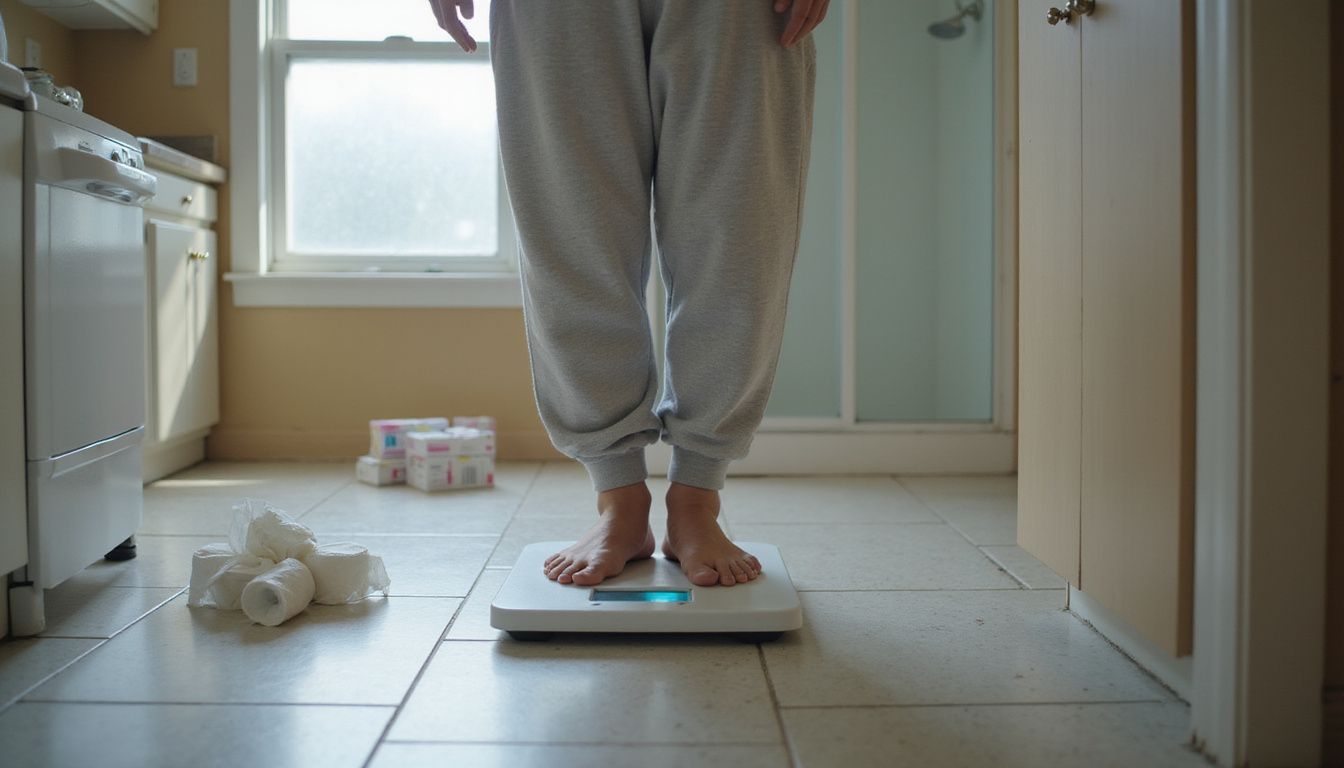Diarrhea Weight Loss: Understanding The Link Between Digestive Health And Rapid Weight Loss
Our Nutrition Assistant AI Suite will transform your body. You will lose fat, get toned, and build muscle. Gain confidence and optimal health.
If loose stools and sudden weight loss show up together, it is normal to worry. Diarrhea and weight loss often occur because your body sheds large amounts of water and minerals when the gut is irritated. In some cases, malabsorption, which means poor nutrient uptake in the small intestine, also plays a role.
This guide explains how diarrhea can result in rapid weight loss, which health problems to consider, and practical steps to protect your digestive health. You will learn what to watch for, how doctors diagnose causes, and which treatments help you feel steady again.
Key Takeaways
- Diarrhea can cause quick weight loss through fluid loss and electrolyte imbalance. Most short episodes resolve within one to two weeks.
- Chronic diarrhea that lasts more than four weeks can signal celiac disease, inflammatory bowel disease, or pancreatic problems that need medical care.
- Severe dehydration signs, such as dark urine, dry mouth, intense thirst, or confusion, need urgent rehydration to prevent serious complications.
- Blood tests, stool testing, imaging like a CT scan, and endoscopy help identify infection, malabsorption, or cancer as the cause of diarrhea with weight loss.
- Treatment often includes oral rehydration, a gentle nutrient-rich diet, targeted medicines, and prompt evaluation if diarrhea persists, weight drops, or blood appears in stool.

What is Diarrhea?

Diarrhea means bowel movements are loose, watery, and often more frequent. It is common and usually points to irritation or infection in the gastrointestinal tract, which includes the stomach, small intestine, and colon.
What causes diarrhea?
Viruses and bacteria are the most frequent causes of diarrhea. Food poisoning or unsafe water can trigger sudden watery stools, cramping, and nausea.
Digestive conditions like irritable bowel syndrome, Crohn’s disease, and ulcerative colitis cause inflammation that disrupts normal bowel function. Food intolerances, especially lactose intolerance, can cause symptoms after milk, cheese, or other dairy.
Some sugar substitutes, such as sorbitol and mannitol in sugar-free gum and candy, can pull water into the gut and loosen stool.
Medicines also matter. Antibiotics, metformin, nonsteroidal pain relievers, and chemotherapy drugs may lead to persistent diarrhea. Clostridioides difficile, a bacterial infection that can follow antibiotics, can cause severe watery diarrhea. Other problems, including celiac disease or reduced pancreatic enzymes, harm nutrient absorption and can cause both diarrhea and weight loss.
Stress, sudden diet changes, and heavy alcohol intake can also trigger symptoms in some people.
“After starting a new prescription drug for my thyroid, I noticed frequent trips to the bathroom and realized that my medicine was causing my digestive problems.”
What is the difference between acute and chronic diarrhea?
Acute diarrhea lasts less than two weeks. It often starts quickly after an infection, food-borne illness, stress, or new medicine. You may notice watery stools, mild cramps, and low-grade fever. Most cases in the United States get better without treatment.
Chronic diarrhea lasts longer than four weeks. It can signal ongoing conditions such as inflammatory bowel disease, celiac disease, or irritable bowel syndrome. About 5 percent of people are affected at any time. Chronic diarrhea can cause significant fluid loss, unintentional weight loss, malnutrition, fatigue, and abdominal pain. Diarrhea that persists for two to four weeks deserves medical attention.
Can diarrhea cause weight loss?
Yes. Diarrhea can lead to weight loss you see on the scale, especially from water loss. If weight drops and diarrhea continues, contact your healthcare provider for evaluation.
How does fluid loss and dehydration affect weight?
Water loss during acute diarrhea lowers body weight quickly. Most of that drop is water, not fat or muscle. As fluid leaves, your cells dry out, which stresses the kidneys and other organs.
Dehydration signs include strong thirst, dry mouth, dark yellow urine, dizziness, and fatigue. Infants and toddlers are at higher risk and may go three hours without a wet diaper. Severe cases can cause cramps, irregular heartbeat, and organ damage.
Electrolytes, including sodium, potassium, and magnesium, also fall. This can cause headaches, confusion, or fainting. During a family bout of gastroenteritis, my cousin lost almost three pounds in two days, but most returned after steady oral rehydration.
Weight lost during diarrhea often comes right back after proper hydration, but ignoring symptoms can risk your health.
How does diarrhea lead to nutrient malabsorption?
When stool moves through the small intestine too fast, the body cannot absorb nutrients well. The gut needs time to take in protein, calories, vitamins, and minerals. Fast transit leaves more nutrients in stool, which lowers the nutrition your body receives.
Conditions like celiac disease, Crohn’s disease, or lack of pancreatic enzymes damage the small bowel lining or limit digestion. This reduces absorption and can lead to low iron, vitamin B12, and fat-soluble vitamins A, D, E, and K. Over time, poor absorption causes fatigue, weight loss, and malnutrition. Blood and stool tests can help confirm these problems.
Why does diarrhea reduce appetite and calorie intake?
Diarrhea often comes with nausea, vomiting, and loss of appetite. Eating can feel risky when every meal seems to trigger cramps or urgency. Pain and fatigue may also make you skip meals.
Severe or long-lasting diarrhea can further suppress appetite, which lowers calorie intake. When I had a viral stomach bug, the constant cramps and rushing to the bathroom made me avoid food for two days. Children and older adults are hit harder, which can lead to faster weight loss.
Causes of Diarrhea Leading to Weight Loss
Different problems can trigger diarrhea that causes unintended weight loss. Knowing the cause guides safer choices and faster recovery.
How do infections cause diarrhea-related weight loss?
Viruses such as norovirus or rotavirus, and bacteria like C. difficile, inflame the gut and can cause acute or persistent diarrhea. You can lose large amounts of fluid and electrolytes within hours, which shows up as quick weight loss.
Infections often bring nausea, vomiting, and fever. Those symptoms reduce appetite and calorie intake. A stool test can confirm infection. Some cases, such as C. difficile, need prescription treatment. Rehydration is critical to prevent complications.
What non-infectious conditions cause diarrhea and weight loss?
Food intolerances, including lactose intolerance and celiac disease, can cause chronic diarrhea and weight loss. When your body reacts to milk sugar or gluten, absorption falls and symptoms can flare after meals.
Food allergies may inflame the gut. Sugar substitutes like sorbitol or mannitol can trigger watery stools. Several medications used for depression, heartburn, or cancer care list diarrhea as a side effect. Diverticulitis can inflame the colon. Low pancreatic enzymes lead to poor digestion of fat and protein, which causes malabsorption and steady weight loss.
Stress can also upset bowel habits. Doctors review your history, diet, and recent stressors, and they rule out infection with tests. Guided diet changes often ease symptoms over time.
Which chronic medical conditions lead to diarrhea and weight loss?
Inflammatory bowel disease, which includes Crohn’s disease and ulcerative colitis, often causes frequent loose stools and reduced absorption. Celiac disease, a reaction to gluten, can lead to diarrhea that lasts more than four weeks, plus weight loss without trying.
Chronic pancreatic insufficiency limits digestive enzymes, so fats and proteins are not broken down well. Microscopic colitis, more common in older adults, causes watery stools and weight loss. A rare lymphoma linked to celiac disease can also present with chronic diarrhea and rapid weight loss.
Some people with irritable bowel syndrome notice weight shifts, often due to food fear or restricted eating. After my colonoscopy and biopsy for chronic symptoms, I learned I had mild Crohn’s disease. Ongoing care helped me stabilize my weight.
How does malabsorption contribute to weight loss?
Malabsorption changes how your body handles food, which can drain energy and weight over time. Understanding the pattern helps you rebuild nutrition step by step.
What are the common nutrient deficiencies from malabsorption?
Frequent loose stools can deplete electrolytes such as sodium, potassium, and magnesium. Conditions like celiac disease or pancreatic insufficiency lower absorption of fat-soluble vitamins A, D, E, and K. Blood work may show low iron or calcium, which can cause anemia or weak bones. B vitamin deficits can reduce energy and affect nerves.
In severe cases, protein loss lowers albumin, which slows healing and can cause swelling. I once helped care for a person with Crohn’s disease who needed electrolyte and protein support after rapid weight loss from ongoing diarrhea.
How do nutrient deficiencies impact overall health?
Low vitamins and minerals affect every system. Fatigue, weak immunity, cramps, and abnormal heart rhythms can follow. Children may face growth delays if deficits last.
Protein loss can cause swelling and raise infection risk. Poor nutrition slows wound healing and can strain organs over time. Early nutrition support helps prevent lasting harm.
How digestive problems cause weight loss
Digestive problems can affect both absorption and metabolism, which changes how your body uses energy. Think of the gut as the body’s fuel line.
What is the connection between the gut and metabolism?
The gut breaks down food and absorbs calories, vitamins, and minerals. If absorption is poor, the body misses fuel. In celiac disease or Crohn’s disease, nutrients may pass through unabsorbed. Pancreatic insufficiency also limits digestion of fats and proteins, which makes weight control harder.
Chronic gut inflammation can alter how cells use energy. Changes in the gut microbiome, the bacteria that live in the intestine, may influence metabolism and fat storage. Ongoing diarrhea can compound these effects by reducing nutrient availability.
How does chronic inflammation affect weight loss?
Inflammation in the digestive tract often causes frequent stools and low absorption. The bowel wall thickens, nutrients are lost, and appetite may fall due to inflammatory signals in the body. To meet energy demands, the body can break down muscle, which increases weight loss.
Symptoms like fever and fatigue can further reduce intake. Many people with chronic gut inflammation need treatments that calm the immune system. Weight loss often mirrors the severity and duration of inflammation. If diarrhea lasts more than four weeks with weight loss, schedule an evaluation.
When should I worry about diarrhea and weight loss?
Some signs point to a more serious problem. Knowing them helps you act early and stay safe.
What are the signs of severe dehydration?
Intense thirst, dry mouth, dark urine, dizziness, and fatigue signal dehydration in adults. Confusion or fainting can be an emergency and may lead to kidney injury if untreated.
In infants, warning signs include no wet diaper for over three hours, crying without tears, irritability, and fever. Electrolyte imbalances from repeated diarrhea can cause cramps or abnormal heart rhythms. Rarely, fluid shifts cause swelling in the belly or around the lungs when protein levels drop.
Rehydration therapy replaces fluid and electrolytes and protects organs. Take action quickly to avoid permanent harm.
What symptoms indicate underlying medical conditions?
Some symptoms during diarrhea suggest a deeper condition. If you notice any of the following, seek care.
- Blood in stool can suggest infection, inflammatory bowel disease, or colorectal cancer.
- Persistent fever, night sweats, and unintended weight loss, sometimes called B symptoms, may point to certain lymphomas.
- Severe fatigue or sudden weakness can reflect malnutrition, anemia, or problems with the liver or pancreas.
- Ongoing abdominal pain, tenderness, or swelling can indicate pancreatitis, cancer, an eating disorder, or chronic inflammation.
- Swollen ankles or shortness of breath may signal broader heart or liver issues.
- Nausea, vomiting, or marked loss of appetite can mean absorption is severely impaired.
- Signs of dehydration include dry mouth, low urine output, fast pulse, or confusion. These need urgent fluids with salt.
- Changes in smell, called anosmia, with diarrhea can occur in some allergies or autoimmune disorders.
- Diarrhea that lasts more than four weeks raises concern for chronic disease or malignancy and needs a full evaluation.
- Lack of response to standard treatment may require tests such as CT scan, endoscopy, colonoscopy, or esophagogastroduodenoscopy.
- Elevated inflammatory markers on blood tests, such as C-reactive protein, suggest active inflammation.
Once I had unexplained fatigue and weight loss with ongoing diarrhea. My doctor ordered blood work and an abdominal and pelvic CT scan, which led to a diagnosis of food-related inflammation.
How long does diarrhea need to last to be concerning?
Diarrhea that lasts more than three days with weight loss should be checked. Acute diarrhea is usually brief, less than two weeks. Symptoms that continue longer increase the risk of dehydration and malnutrition.
Persistent diarrhea for 2 to 4 weeks or chronic diarrhea beyond four weeks needs medical care. Blood in stool, fever, or loss of appetite with rapid weight change are urgent signs. Early care can prevent severe complications.
How is the link between diarrhea and weight loss diagnosed?
Doctors piece together your history, symptoms, exams, and test results to find the cause. The goal is to locate the problem, then treat it directly.
What health history and symptoms are assessed?
Healthcare providers ask about how long the diarrhea has lasted, how often it occurs, and what the stools look like. They track related symptoms such as abdominal pain, fever, fatigue, or unintended weight loss to guide testing.
Recent travel, contact with sick people, or exposure to unsafe food or water can point to infection. Your medicine and diet history, including laxatives and alcohol, may reveal triggers. Appetite changes and a family history of digestive disease also help focus the workup.
Which laboratory tests and imaging help diagnose?
Several tests can identify the cause of diarrhea and weight loss. These tools look for infection, inflammation, malabsorption, or cancer.
- Blood tests for infection, inflammation, thyroid function, and nutrient levels such as iron, B12, and albumin.
- Stool testing for bacteria, viruses, blood, and inflammation markers to pinpoint triggers.
- Colonoscopy or sigmoidoscopy to view the colon and rectum for inflammation, polyps, or suspicious growths.
- Imaging such as abdominal ultrasound, X-ray, or CT scan to assess blockages, tumors, or structural problems.
- Fecal elastase or alpha-1 antitrypsin to evaluate pancreatic function and protein loss in stool.
- Tumor markers such as CEA or CA 19-9 when cancer is suspected.
- Analysis of fluid in the belly if there is abdominal swelling, checking for infection or cancer cells.
- Tests for autoimmune disease or abnormal proteins if a systemic condition is suspected.
Doctors combine these results with your symptoms and diet history to confirm the cause and guide treatment.
What does stool analysis reveal?
Stool tests can detect germs that cause diarrhea, including bacteria, viruses, and parasites. Blood in stool can suggest inflammation or cancer, which may lead to screening.
Fecal elastase helps assess pancreatic function. High alpha-1 antitrypsin can indicate protein loss through the gut. Markers of inflammation can support a diagnosis of inflammatory bowel disease. Findings such as fat, mucus, or undigested food suggest problems with digestion or absorption. Persistent abnormal results often lead to endoscopy.
What are the treatment options for diarrhea and weight loss?
Treatment starts with the cause. Rehydration and gentle nutrition come first, followed by targeted therapy based on test results.
How is rehydration and electrolyte balance managed?
Replace fluids with water, clear broths, or commercial oral rehydration solutions. These drinks contain sodium, potassium, and glucose to help your body absorb water and correct imbalances.
Severe dehydration may need intravenous fluids, especially if there is confusion, fast heart rate, or very low urine output. In hospitals, blood tests guide fluid and electrolyte replacement. For infants and young children, rapid rehydration can prevent kidney injury and heart rhythm problems.
Check urine color and frequency at home. During my recovery from a stomach infection, small sips of oral rehydration solution lifted my energy within hours.
What dietary adjustments help?
Diet can calm the gut while you heal. Start simple, then reintroduce foods slowly to find triggers.
- Choose bland foods such as bananas, rice, baked chicken, and chicken soup during flares.
- Avoid fatty, fried, or very spicy foods, and limit dairy if it worsens symptoms.
- Try a short elimination diet, removing common triggers like wheat, dairy, eggs, nuts, corn, and soy for two weeks.
- Use a food diary to track symptoms as you add items back to spot intolerances.
- Offer children meat stock to support hydration and recovery during episodes.
- Follow strict gluten-free plans for celiac disease or other prescribed diets as advised.
- Adjust long term if you have IBS or IBD, since tolerances can change.
- Consider probiotics to help restore healthy gut bacteria and reduce symptom days.
- Prioritize hydration with water or oral rehydration drinks, especially if appetite is low.
- Choose nutrient-dense foods that are easy to digest to rebuild strength.
- Seek guidance from a clinician or dietitian if diarrhea is frequent or weight keeps dropping.
After a week of bland foods during a flare, my energy improved. Adding a probiotic seemed to steady my digestion.
Which medications treat underlying causes?
Prescription medicines depend on the diagnosis. Bacterial infections, including C. difficile, often need antibiotics. Inflammatory conditions like Crohn’s disease or ulcerative colitis may require anti-inflammatory drugs or immune-modulating therapy.
Some cancers need chemotherapy directed by an oncology team. If malnutrition is severe due to poor absorption, short-term nutrition by vein may be necessary before further treatment. My doctor once adjusted my metformin when it triggered gut symptoms, and the change quickly improved my digestion and energy.
Never start antidiarrheal drugs without knowing the cause. They can worsen some infections and inflammatory conditions.
How can lifestyle changes improve digestive health?
Daily habits can protect your gut and keep weight steady. Small changes add up over time.
Why is a balanced diet important?
A balanced diet supplies protein, vitamins, and minerals that the body cannot make. These nutrients support the immune system and help you recover from malabsorption. Children and older adults need extra attention during illness because they can lose weight quickly.
Eating a variety of foods also supports a healthy microbiome, which plays a role in digestion and overall health. Nutrition counseling can help if you have long-term symptoms or rapid weight loss.
Which irritants should be avoided?
Sorbitol and sucralose can trigger diarrhea in some people. Heavy alcohol use can inflame the gut and worsen symptoms. Fatty or spicy foods often aggravate flares. Avoid dairy if you have lactose intolerance or active diarrhea.
Some medicines, including certain antidepressants, magnesium-containing antacids, and cancer therapies, can irritate the gut. Highly processed foods or additives may also upset digestion. When I cut back on processed snacks, my gut felt calmer and episodes were less frequent.
What are the benefits of probiotics?
After reducing irritants, probiotics can help restore balance. These are helpful bacteria found in yogurt, kefir, and some supplements. Research suggests probiotics can shorten infectious diarrhea and may ease irritable bowel syndrome symptoms for some people.
They are generally safe for healthy adults. If you have a serious illness or take immune-suppressing drugs, ask your doctor before starting any supplement.
What are the risks of using laxatives for weight loss?
Laxatives do not lead to real fat loss. They move stool and water, which can strain the gut and heart over time.
What are the long-term health consequences?
Long-term laxative use can cause chronic dehydration, kidney injury, and severe malnutrition. Electrolyte problems can trigger dangerous heart rhythms. Ongoing use may raise the risk of weak bones due to calcium loss.
The bowel can become sluggish and less responsive, and in rare cases, a tear can occur. Some people grow dependent on laxatives, which makes recovery harder and may require specialist care.
How do laxatives disrupt gut health?
Overuse can make the gut rely on laxatives for bowel movements. Muscles in the colon can weaken, and normal function can slow down. Dehydration and low potassium or sodium put stress on the heart and kidneys.
Laxatives can also disturb the gut microbiome. When helpful bacteria decline, digestion and immunity suffer. For those with existing gut disease, overuse can worsen symptoms and reduce nutrient absorption.
How can digestive issues and unintended weight loss be prevented?
Simple habits reduce risk and support recovery. Aim for steady hydration, smart food choices, and early care when symptoms last.
Why is maintaining hydration important?
During diarrhea, you lose water and electrolytes quickly. Severe dehydration can cause kidney injury and abnormal heart rhythms. Signs include dry mouth, strong thirst, and dark urine.
Staying hydrated protects digestion and helps replace what is lost. Oral rehydration solutions support both water and salt balance. Careful hydration is especially important if you already have a health condition.
How can food intolerances be recognized?
Food intolerances often cause nausea, cramps, bloating, and diarrhea after eating certain items. Tracking your meals and symptoms can reveal patterns.
Many clinicians suggest removing common triggers like dairy or gluten for two weeks, then reintroducing them one at a time. For example, my symptoms faded when I paused dairy. When I reintroduced cheese, cramping and diarrhea returned. If symptoms last more than four weeks or weight drops fast, seek medical care.
When should you seek medical help?
Get help if diarrhea lasts more than three days in a healthy adult, or if weight drops by more than 10 pounds or 5 percent within six to twelve months. Severe dehydration, such as intense thirst with very low urine, needs urgent care. In young children, call a clinician if dehydration lasts more than one day.
Chronic diarrhea beyond four weeks raises the risk of malnutrition and may signal a deeper condition. After a trip abroad, I developed severe diarrhea and rapid weight loss. Quick treatment prevented further decline.
Conclusion
Understanding the link between diarrhea and weight loss helps you act early and stay safe. Short episodes mainly cause water loss. Persistent symptoms can point to conditions like celiac disease or inflammatory bowel disease that need diagnosis and treatment.
If diarrhea and unexpected weight loss occur together, see a healthcare provider. Care usually starts with rehydration, gentle nutrition, and testing to find the cause. Healthy daily habits, a balanced diet, and close attention to warning signs support recovery and help you maintain a stable weight.
This article offers general information, not medical advice. For personal guidance, consult a qualified clinician. Sources for clinical guidance include the World Health Organization and the Centers for Disease Control and Prevention.
FAQs
1. What causes diarrhea-related weight loss and how is it linked to digestive health?
Diarrhea can lead to rapid weight loss because the body loses fluids, electrolytes, and nutrients faster than it can absorb them. This process often signals an underlying digestive health issue, such as infection, food intolerance, or chronic gastrointestinal disease. Clinical studies show that persistent diarrhea can result in significant nutrient loss, which affects overall health and body weight.
2. Is weight loss from diarrhea safe or healthy?
Weight loss from diarrhea is not considered healthy. Most of the weight lost comes from water and essential nutrients, not fat. Medical research indicates that rapid fluid loss can cause dehydration and electrolyte imbalance, which may require medical attention. Safe weight loss should involve gradual fat reduction, not loss of fluids or muscle mass.
3. How can I tell if my rapid weight loss is due to digestive problems?
Signs that digestive health is affecting weight include frequent loose stools, abdominal pain, and fatigue. If these symptoms last more than a few days or are severe, it is important to consult a healthcare provider. Data from clinical guidelines recommend seeking help if diarrhea is persistent, as it may indicate a more serious condition.
4. What steps can I take to manage diarrhea and prevent unhealthy weight loss?
To manage diarrhea and prevent unhealthy weight loss, focus on staying hydrated and eating easy-to-digest foods. Oral rehydration solutions can replace lost fluids and electrolytes. If symptoms persist, seek medical advice to identify and treat the underlying cause. Personal experience shows that tracking symptoms and dietary changes helps in finding triggers and improving digestive health.
Summary: Diarrhea-related weight loss is often a sign of digestive health problems. Rapid loss of fluids and nutrients can harm the body. Recognizing symptoms early and seeking medical care supports better health outcomes.







